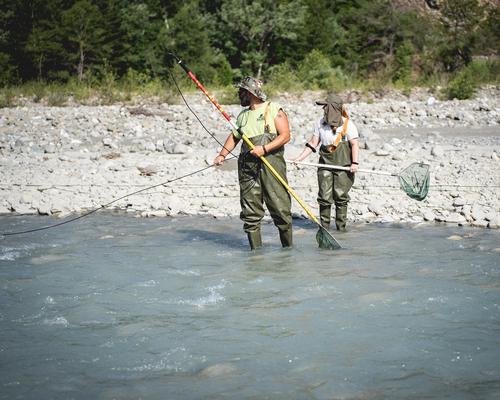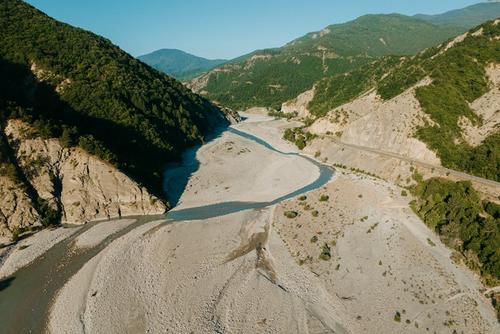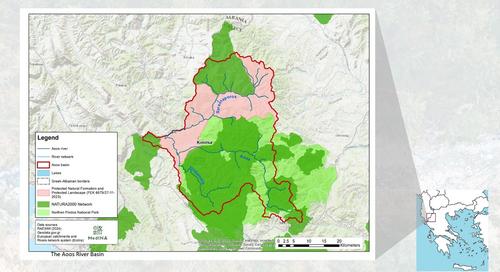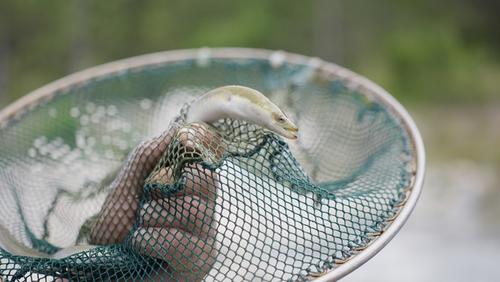More than sixty volunteer scientists from nine countries, explored the hidden life of the Sarantaporos River, the “big brother” of Europe’s last free-flowing river, the transboundary Aoos/Vjosa River.

Scientists from a wide range of disciplines spent a week working together on the Sarantaporos River in Greece. Their findings should help to protect the river even better.
© Aris Giannoukos
The Sarantaporos still flows freely through the Greek mountains of the Pindos.
© A. Giannoukos/MedINA
The Aoos River basin and current protection statuses
© MedINA
“The European eel is highly threatened, especially by river barriers such as dams. Our results showed that the Sarantaporos harbours populations of this species. The protection of this unique river ecosystem is crucial for the conservation of this iconic species”, said Leonidas Vardakas, Ichthyologist at Hellenic Centre for Marine Research.
© Joshua D. LimAthens/Tirana/Radolfzell/Vienna. From 28 June to 5 July 2024, a multidisciplinary team of scientists from several European countries and the US worked together to carry out extensive field research on the Sarantaporos River, a tributary of the Aoos, united under a common mission: to bring the whole Aoos/Vjosa River catchment under a common protection status by creating a Transboundary Wild River National Park, that would be unique in Europe.
In the Municipality of Konitsa the researchers examined more than 50 kilometres of river and streams for animal species of all classes. They also researched physicochemical and hydromorphological characteristics of the river. In the upcoming months, the experts will assess their valuable findings and prepare a final report by the end of the year, which will be delivered to Ministries, regional authorities, as well as local communities.
“In general, people forget that rivers are not just stretches of water, as they form networks and very rarely do we have whole river networks saved today. With the Aoos/Vjosa system, including the tributaries, we have a unique chance in Europe to save a whole river network that drains about 7000 sq. km. of catchment area”, said Gabriel Singer, Fluvial Ecosystem Ecologist at the University of Innsbruck.
The new scientific data will reinforce the recent designation of the largest part of the Sarantaporos catchment area as a Protected Landscape by the Ministry of Environment and Energy. The Ministerial Decision, which was issued a few days before the start of the Scientific Week, set out the development conditions and restrictions on activities within the protected area, prohibiting, inter alia, the construction of dams and hydroelectric power plants, including Small Hydropower Plants (SHPs). Unfortunately, this positive development does not relieve Aoos and its tributaries from the threat of SHPs since several projects are planned outside the recently designated protected area, while others are already at an advanced licensing stage.
“Αlthough the new regulations rule out the construction of approximately 15 SHPs in the Sarantaporos catchment area, about 20 projects could still be legally constructed in its stretches. The inclusion of the whole Aoos catchment area under a uniform strong protection status will safeguard its free-flowing waters from the expansion of hydropower. This step is urgently needed to achieve protection for the entire Aoos/Vjosa catchment by establishing the much-anticipated Transboundary Wild River National Park”, said Dimitris Papageorgiou, Local Coordinator & Project Manager at MedINA.
The next step entails upgrading the protection status of the area to a National Park by expanding the boundaries of Northern Pindos National Park towards the Greek-Albanian border. This will connect this protected area with the neighbouring Vjosa Wild River National Park to establish the first Transboundary Wild River Park in Europe, Aoos/Vjosa.
Hintergrundinformationen:
- Sarantaporos Science Week was organised by the Mediterranean Institute for Nature and Anthropos (MedINA) in cooperation with EuroNatur, Riveratch and EcoAlbania, as part of the Save the Blue Heart of Europe campaign, with the support of the Municipality of Konitsa and the Hellenic Centre for Marine Research (HCMR).
The activity was funded by Prespa Ohrid Nature Trust (PONT) under the “Ri-Connect - Aoos river as a transboundary ecological corridor " project, Patagonia, the Austrian Development Agency through the project “ESPID4Vjosa”, Manfred-Hermsen-Stiftung, EU LIFE and Wetlands International Europe.
- The initiative to protect the Aoos/Vjosa is part of the “Save the Blue Heart of Europe” campaign, organized by RiverWatch and EuroNatur. The campaign aims to protect rivers of high natural value in the Balkans, which are threatened by over 3,300 hydropower projects. In Albania, the local partner is EcoAlbania, while in Greece, the local partner is MedINA. In our efforts to protect the Aoos/Vjosa as a National Park, we partner with the outdoor company Patagonia.
- The “Save the Blue Heart of Europe” campaign is supported amongst others by the Manfred-Hermsen-Stiftung.
Contact:
Dimitris Papageorgiou – MedINA, dimitris(at)med-ina.org
Besjana Guri – EcoAlbania, b.guri(at)ecoalbania.org
Christian Stielow – EuroNatur - christian.stielow(at)euronatur.org
Ulrich Eichelmann – Riverwatch, ulrich.eichelmann(at)riverwatch.eu


